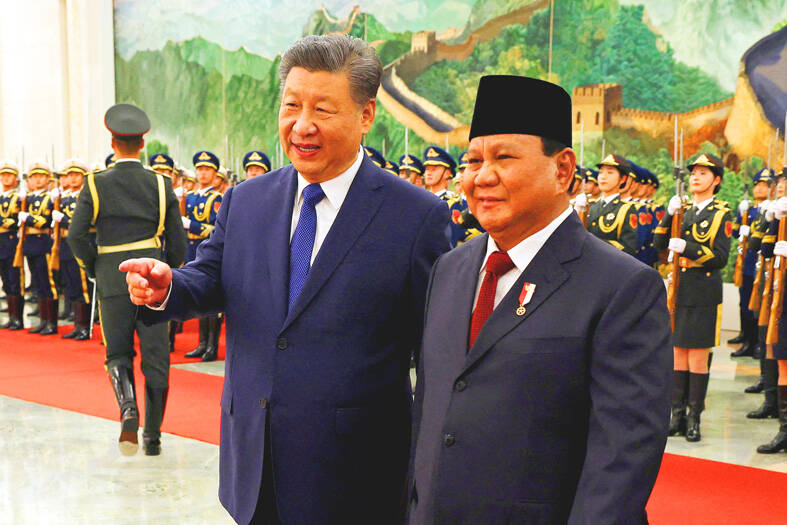Indonesia yesterday said it does not recognize China’s claims over the South China Sea, despite signing a maritime development deal with Beijing, as some analysts warned the pact risked compromising its sovereign rights.
Beijing has long clashed with Southeast Asian neighbors over the South China Sea, which it claims almost in its entirety, based on a “nine-dash line” on its maps that cuts into the exclusive economic zones (EEZ) of several countries.
Joint agreements with China in the strategic waterway have been sensitive for years, with some nations wary of deals they fear could be interpreted as legitimizing Beijing’s vast claims.

Photo: Reuters
In 2016, an arbitral tribunal said the Chinese claim, based on its old maps, has no basis in international law, a decision China refuses to recognize.
A joint statement issued at the weekend during Indonesian President Prabowo Subianto’s visit to Beijing mentioned the two countries had “reached important common understanding on joint development in areas of overlapping claims.”
The Indonesian Ministry of Foreign Affairs has repeatedly said the country is a non-claimant state in the South China Sea and has no overlapping jurisdiction with China.
Yesterday, the ministry said its position was unchanged and the agreement would have no impact on its sovereign rights.
“Indonesia reiterates its position that those [Chinese] claims have no international legal basis,” it said.
“The partnership does not impact sovereignty, sovereign rights or Indonesia’s jurisdiction in the North Natuna Sea,” it said.
The Chinese Ministry of Foreign Affairs said the clause “clarifies the political consensus and direction of co-operation between the two sides on joint development in the overlapping maritime areas claimed by the two countries.”
Chinese ministry spokesperson Lin Jian (林劍) said Indonesia and China would further explore topics such as the content and mode of cooperation, adding that there was a historical basis for China’s South China Sea claims and that consensus would benefit both.
China’s U-shaped line, based on its old maps, begins off central Vietnam and runs into waters off Indonesia’s Natuna islands, more than 1,000km south of the Chinese island of Hainan.
It crosses into the EEZs of Brunei, Malaysia, the Philippines and Vietnam, and is patrolled by an armada of the Chinese coast guard, which neighbors accuse of aggression and seeking to disrupt energy and fisheries activity.
China typically says its vessels are preventing incursions into its territory.
The Indonesian ministry said the economic agreement on maritime issues with China covered fisheries and fish conservation, and hoped it would be a model to safeguard peace and friendship.
However, some Indonesian analysts said that signing such an agreement could have repercussions and be interpreted as a change in stance.
“If we refer to the official joint statement, that means we recognize overlapping claims,” maritime analyst Aristyo Rizka Darmawan said, adding that it could compromise Indonesia’s sovereign rights to exploit resources in its EEZ.
Indonesia might have signed the agreement with the intention of boosting economic ties, he added.
Klaus Heinrich Raditio, a lecturer in Chinese politics, said Indonesia never had overlapping claims to begin with and the clause’s inclusion in the statement was “inappropriate.”
“This joint statement puts our national interests at risk,” he said, adding that it could still be renegotiated.

Indonesia and Malaysia have become the first countries to block Grok, the artificial intelligence (AI) chatbot developed by Elon Musk’s xAI, after authorities said it was being misused to generate sexually explicit and nonconsensual images. The moves reflect growing global concern over generative AI tools that can produce realistic images, sound and text, while existing safeguards fail to prevent their abuse. The Grok chatbot, which is accessed through Musk’s social media platform X, has been criticized for generating manipulated images, including depictions of women in bikinis or sexually explicit poses, as well as images involving children. Regulators in the two Southeast Asian

COMMUNIST ALIGNMENT: To Lam wants to combine party chief and state presidency roles, with the decision resting on the election of 200 new party delegates next week Communist Party of Vietnam General Secretary To Lam is seeking to combine his party role with the state presidency, officials said, in a move that would align Vietnam’s political structure more closely to China’s, where President Xi Jinping (習近平) heads the party and state. Next week about 1,600 delegates are to gather in Hanoi to commence a week-long communist party congress, held every five years to select new leaders and set policy goals for the single-party state. Lam, 68, bade for both top positions at a party meeting last month, seeking initial party approval ahead of the congress, three people briefed by

The Chinese Embassy in Manila yesterday said it has filed a diplomatic protest against a Philippine Coast Guard spokesman over a social media post that included cartoonish images of Chinese President Xi Jinping (習近平). Philippine Coast Guard spokesman Jay Tarriela and an embassy official had been trading barbs since last week over issues concerning the disputed South China Sea. The crucial waterway, which Beijing claims historic rights to despite an international ruling that its assertion has no legal basis, has been the site of repeated clashes between Chinese and Philippine vessels. Tarriela’s Facebook post on Wednesday included a photo of him giving a

ICE DISPUTE: The Trump administration has sought to paint Good as a ‘domestic terrorist,’ insisting that the agent who fatally shot her was acting in self-defense Thousands of demonstrators chanting the name of the woman killed by a US federal agent in Minneapolis, Minnesota, took to the city’s streets on Saturday, amid widespread anger at use of force in the immigration crackdown of US President Donald Trump. Organizers said more than 1,000 events were planned across the US under the slogan “ICE, Out for Good” — referring to the US Immigration and Customs Enforcement, which is drawing growing opposition over its execution of Trump’s effort at mass deportations. The slogan is also a reference to Renee Good, the 37-year-old mother shot dead on Wednesday in her